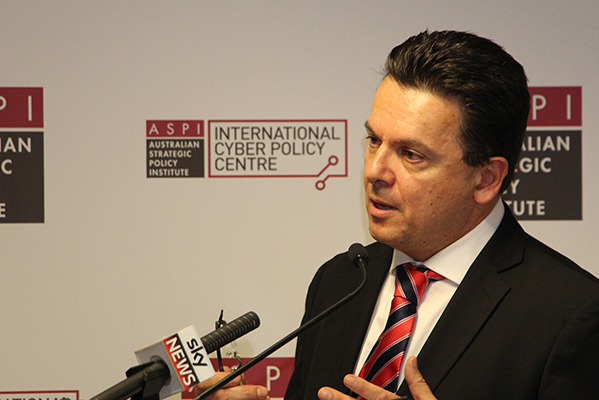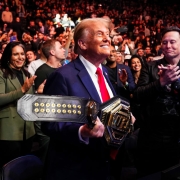ANZUS, war powers and killing the chicken to scare the monkey

Future historians might well consider that this current period is a turning point in Australian strategic history.
Last month, Foreign Minister Julie Bishop pointed out that ‘[many] of our assumptions founded on the international rules-based order that evolved after World War II, now appear less certain.’ She called on the United States to ‘play an even greater role as the indispensable strategic power in the Indo-Pacific,’ a call she had made earlier in the year in Los Angeles, at the US-Australia Dialogue on Cooperation in the Indo-Pacific. On that occasion, she said that ‘[most] nations wish to see more United States leadership, not less, and have no desire to see powers other than the US, calling the shots.’
Clearly, while other challenges exist, the question of China looms large. There is no doubt in my mind that the ANZUS alliance is the most important strategic alliance we have. As Peter Edwards argued in 2005, ‘successive Australian governments, both Labor and Coalition, have convinced themselves, and sought to persuade their public’ that the benefits of the alliance are five-fold:
- the security guarantee;
- access to high-level US policy-makers;
- access to unique intelligence information;
- access to advanced science and technology; and
- the economic benefits of the Free Trade Agreement.
While intellectual challenges can, and have, been mounted to each of these five claimed benefits, I am sure that the alliance enjoys considerable public support. It certainly has my support. Indeed, as ASPI’s own research in 2008 demonstrated, ‘an overwhelming majority of voters and major party candidates see the ANZUS alliance as important to Australia, the only question being whether they see it as “very” or “fairly” important.’
The big strategic question for Australia is how to negotiate the tension between our key security partner and our key trading partner.
We’ve never had this question arise in the first 220 years of European settlement. From January 1788, when the First Fleet sailed into Botany Bay, to 2008, during the Global Financial Crisis, we’ve had first Britain and then the USA as our trading partner and strategic ally. But now China is our largest two-way trading partner in goods and services (valued at $150.0 billion in 2015–16), our largest export market ($85.9 billion) and our largest source of imports ($64.1 billion).
Last year the RAND Corporation published a report called ‘War with China: Thinking Through the Unthinkable’. It makes sobering reading. Their research team concluded that:
‘war between the two countries could be intense, last a year or more, have no winner, and inflict huge losses and costs on both sides. The longer such a war continued, the more significant economic, domestic political, and international effects would become. While such non-military effects would hit China hardest, they could also greatly harm the U.S. economy and the U.S. ability to meet security challenges worldwide.’
This is something that really cries out for attention by all members of the Australian Parliament.
What happens—or does not happen—is of the highest significance to Australia. The signals we send to either side about Australia’s position requires extensive consideration in the Australian Parliament.
Australia would not be spared from disruption to our economy and demography. RAND said a US-China war could shrink China’s GDP by 25–35% and the USA’s by 5–10%. But given our much higher trade dependence on China—four times more reliant as a proportion of GDP than the US—a 30% contraction would not be out of the question. And demographically? Seeing Chinese Australians and Chinese students on our streets shows how integral they’ve become to our nation’s fabric.
A war with China would rip Australia’s economic and social fabric apart. I don’t think any Australian participation in the South China Sea ought to occur until every member of the Australian Parliament has had a chance to vote on it, and has been put on the spot to explain their reasons individually—not hide behind the line of their respective party.
I believe that parliamentary authorisation is workable and can be formulated in a suitably flexible way that takes a variety of contingencies into account, protects the security of classified information, and copes with the time-sensitive nature of emergency military deployments. In requiring Parliamentary approval, it is necessary to distinguish between ‘wars of choice’ and ‘wars of necessity’. Wars of necessity refer to military actions taken in self-defence and require the use of rapid and/or covert military force.
At the moment, the danger is one of a surprise war, as a result of an escalation during (say) a freedom of navigation exercise, in which Australia’s Executive deploys forces without any effective check from the legislature, since the only option parliament has is to bring down the government through a motion of no-confidence—something that backbenchers in a governing political party can hardly be expected to do, whatever their misgivings about a particular military deployment.
Furthermore, using the line and military strategy attributed to Sun Tzu, China may decide to ‘kill the chicken to scare the monkey’—sink an Australian vessel to warn off the United States Navy. The signals we send to either side about Australia’s position are of the highest economic and strategic significance. What we do requires extensive consideration in the Australian Parliament.
Whilst this debate has been both energised and exercise by the Trump Presidency, it’s worth remembering it was no less than the husband of Candidate Trump’s rival who said, while he was in office, ‘We will act multilaterally where we can, unilaterally when we must’. Australia alone should decide which wars we go to, and the circumstances in which we go to them. That goes to the heart of our sovereignty. Australia must not get involved in a South China Sea conflict until every member of the Australian Parliament has voted on it, and explained their reasons individually—not hide behind a party line.
What’s more, that process should be enshrined in Australian legislation; no Australian military actions ought to occur without parliamentary authorization, except in self-defence. More than ever, since 1788, it’s a law whose time has come.

